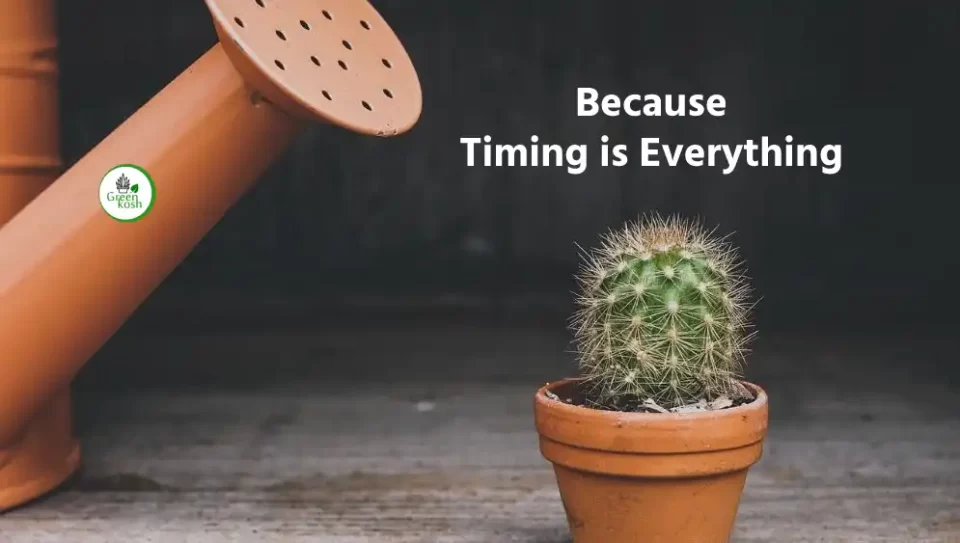Watering your plants is an essential part of keeping them healthy and vibrant, but it’s also important to be mindful of when and how you water. Watering your plants at the wrong time or in the wrong way can be just as detrimental as not watering them enough. In this article, we’ll explore the importance of understanding your plants’ watering needs and the worst times to water, as well as how to correctly water your plants for optimal health.

The Mistake of Watering at the Wrong Time
While watering your plants is important, it’s equally important to be mindful of when you water them. Watering at the wrong time can lead to a variety of problems, including leaf scorch, fungal growth, and root rot. For example, watering in the heat of the day can cause the water to evaporate before it reaches the roots, while watering in the evening can leave the foliage wet overnight, which can promote fungal growth.
The Worst Times to Watering Plants
As mentioned earlier, watering at the wrong time can lead to a variety of problems for your plants. Here are some specific examples of the worst times to water:
Watering at the wrong time of day:
- Watering in the heat of the day: Watering in the heat of the day (between 10am and 2pm) can cause the water to evaporate before it reaches the roots, which is a waste of water and can also lead to leaf scorch.
- Watering in the evening: Watering in the evening can leave the foliage wet overnight, which can promote fungal growth.
Watering during the wrong season:
- Watering during dormancy: Some plants enter a dormant state during certain times of the year, during which they don’t require much water. Watering during dormancy can disrupt this natural process and damage the plant.
- Watering during periods of high heat or drought: During periods of high heat or drought, the soil can become extremely dry, and watering too much can cause the soil to become waterlogged. This can lead to poor drainage and root rot. It’s important to be mindful of your plants’ watering needs during these times and adjust accordingly.
Understanding Plant Watering Needs
The needs of your plants will vary depending on the type of plant, soil type, and climate. In order to determine when your plants need watering, you’ll need to take these factors into consideration.
Factors that affect watering needs:
- Type of plant: Different types of plants have different watering needs. Some plants, such as succulents, store water in their leaves and can survive with less frequent watering, while other plants, such as tomatoes, need more consistent watering.
- Soil type: The type of soil in your garden can also affect how much water your plants need. Sandy soils will dry out more quickly than clay soils, which retain moisture longer.
- Climate: The climate in your area can also affect how often you need to water your plants. In areas with hot and dry climates, you may need to water more often, while in areas with cooler and wetter climates, you may need to water less.
How to determine when a plant needs watering?
You can determine when a plant needs watering by checking the soil moisture. This can be done by sticking your finger into the soil or by using a moisture meter. The soil should be moist but not saturated. If it’s dry or dusty, it’s time to water.
Importance of not overwatering
It is also important not to overwater your plants. Overwatering can lead to root rot and fungal growth. In general, it’s better to underwater than overwater.
How to Correctly Water Your Plants
Now that you know some of the worst times to water, let’s go over how to correctly water your plants for optimal health.
Best time of day to water
The best time of day to water your plants is in the morning, when the temperature and humidity is low. This will allow the water to be absorbed by the roots before the heat of the day and minimize evaporation.
How often to water
How often you should water your plants will depend on the factors discussed earlier: type of plant, soil type, and climate. As a general rule, you should allow the top inch of soil to dry out before watering again.
Proper watering techniques
The way you water your plants is just as important as when you water them. Avoid watering from overhead, as this can lead to leaf scorch and fungal growth. Instead, water at the base of the plant, which will allow the water to be absorbed by the roots.
Tools to help with watering
There are a variety of tools that can help with watering your plants, such as a moisture meter, irrigation system, or a watering can. Using these tools can help you keep track of how much water your plants are getting, and make watering more efficient.
Watering your plants is essential for their health and vitality, but it’s important to be mindful of when and how you water them. Understanding your plants’ watering needs, and avoiding the worst times to water, will help you keep your plants healthy and thriving. It may take a little extra effort, but by taking the time to water your plants correctly, you’ll be rewarded with beautiful and healthy plants. Remember, water your plants correctly will help them thrive and be healthy.
FAQs
Q1: What is the worst time of the day to water my plants?
The worst time to water plants is during the heat of the day between 10am and 2pm, as the sun’s rays are at their strongest and the water droplets on the leaves can act like magnifying glasses, scorching and burning the leaves.
Q2: Is it bad to water my plants in the evening?
Watering your plants in the evening can be quite damaging, as the cool night air causes the water droplets on the leaves to condense, creating an environment that’s perfect for fungal growth.
Q3: Is it bad to water my plants during a drought?
Watering your plants during a drought can be harmful as the soil is already dry and hard, making it difficult for the water to penetrate. This can cause the water to run off the surface of the soil, not providing enough hydration to the roots of your plants.
Q4: Is overwatering bad for my plants?
Overwatering can be just as harmful as underwatering your plants, as waterlogged soil can lead to root rot and can make it difficult for your plants to absorb oxygen, leading to yellow and wilted leaves.
